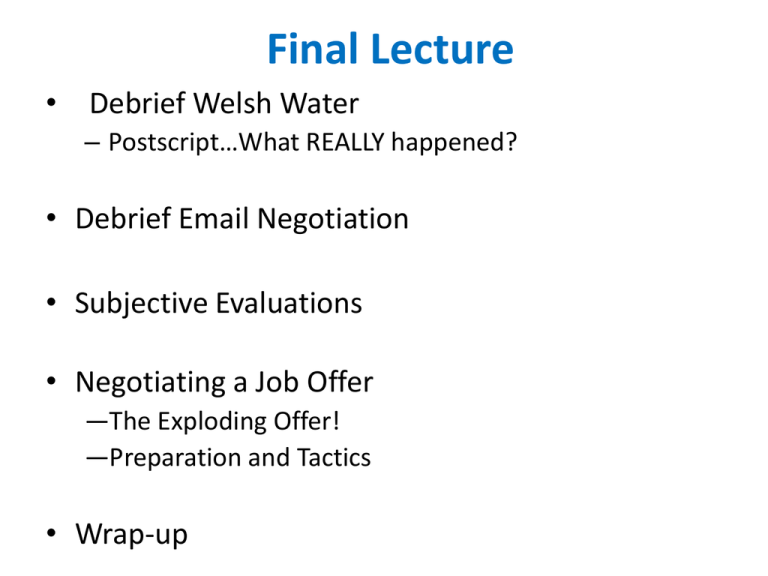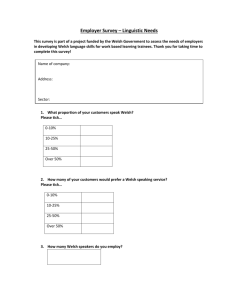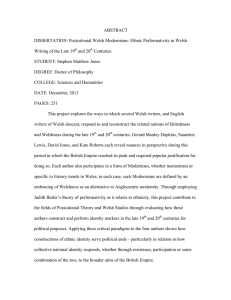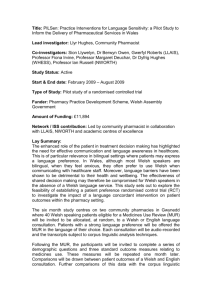Final Lecture
advertisement

Final Lecture • Debrief Welsh Water – Postscript…What REALLY happened? • Debrief Email Negotiation • Subjective Evaluations • Negotiating a Job Offer ―The Exploding Offer! ―Preparation and Tactics • Wrap-up THEMES • Welsh Water – Coalitions…Perceived or Real? – What REALLY happened? • Email Negotiation – When well done, outcomes mimic face to face negotiation! • Subjective Evaluations – How others see you! • Negotiating a Job Offer – What to do to improve success – Thinking “on your feet” → The Exploding Offer Welsh Water Postscript What REALLY Happened? 3 Partnership 1 • Under leadership of Brian Charles, Welsh negotiated an approach to bargaining with the unions • This and the subsequent agreement is called “Partnership 1” 4 Union Recognition • Management was extremely nervous about its ability to bring NUPE into an agreement as it represented major disruptive potential • They began informal discussion with other unions about de-certification • Issue came to a head when a particularly hard-line officer of NUPE was assigned • This was the final straw 5 The “Dawn Raid” • The history with this individual precipitated a “dawn raid” one Friday morning, when NUPE was formally informed it had been de-recognized • NUPE screamed “Bloody Murder” and called for “worker solidarity” from the other unions • Welsh stood firm: several NUPE shop stewards were persuaded to accept attractive early retirement and severance packages. • This cleared the air for further negotiations 6 Annual Pay Increase • A CPI linked increase represented a dilemma to the union: – Unions conceived to wrest larger and larger increases in profit shares to workers – CPI linked increases acknowledges this is not an objective • Minimum annual increase = CPI for two years subject to a market position modification 7 Market Position Guarantee • Welsh workers paid on average at 75th percentile in SW region of the UK • Welsh guaranteed that they would stay at the 75th percentile: – If position decreased annual compensation would exceed the CPI to compensate – If position increased Welsh entitled to “clawback” annual increases of less than CPI until wages stabilized 8 • The Unions were excited about this, as it was a generous offer • In order to guarantee neutrality, the Cardiff Business School was commissioned to study comparative organizations, to maintain an updated account of pay levels and to make recommendations of annual increases within an agreed-upon list of skill levels 9 Single Status Pay Scales • Welsh proposed one in place of three pay scales (unskilled, skilled, clerical and office) Tended to discriminate against lower skill levels Largely the product of redundant historical negotiations • One level viewed by all as more equitable and easier to manage under the new pay formula and market monitoring system • Higher paid workers were empathetic 10 Profit Sharing • Workers allowed to vote a percentage of each year’s annual increase into a profit sharing scheme that would yield dividends linked to profitability – Reduced cash handovers from Welsh – Gave workers a profit share motive • Great skepticism by Unions • BUT five years later it was wildly popular! – 7-8% Dividend is well above the CPI 11 Scheduled Work Time • Reduced from 38 to 37 hours just when Welsh needed to increase productivity • The Partnership philosophy gave management some flexibility: – Move from traditional 9-5 day to an annual average of 37 hours per week – Workers in turn got a guaranteed average 37 hours per week salary plus some overtime 12 • Initial cynicism: seen as a means to keep wages down and eliminate some overtime • But it offered personal scheduling flexibility: e.g. a 4-day weekend every two weeks. • Resistance was initially too great to adopt it outright: – Local depots and units had the right to choose the system for a year – Ultimately it also became wildly popular! 13 Job Security Much discussion! Managing Director Brian Charles said: “We had never had a compulsory layoff, and we thought that we could keep to that, especially since it met so much to the unions…so we say ‘We guarantee you a job—but we don’t guarantee that it will be the same job. We may need to put you elsewhere in order to match the organization’s needs’.” 14 Partnership 2 • Partnership 1 was a success and the Unions re-ratified the agreement with some minor refinements in pay increase and evaluation systems. 15 Negotiating a Job Offer “If you do not negotiate what you want in that brief window between your receipt of a job offer and your acceptance of it, you may never get it.”* *Thompson p 378 Preparation • Sounds corny but….preparation is essential • To codify your preferences among alternative job choices – Construct a Hierarchy of Objectives – Use it to rank order alternatives – Best description of how to do it: Chapter 2 of Keeney & Raiffa Decisions with Multiple Objectives (1976) Rank Job Alternatives Maximize Outside work Life Style Hours per Week Free Time City Quality Neighborhood Housing Maximize Financial Rewards Maximize Work Environment Quality Good social networking opportunities Work Related Travel # Trips per Month Travel Destinations Promotion Track Training & Personal Development Boss & cohorts Salary & Bonus Future Trajectory Minimize Living Costs Current The Exploding Offer “In our experience, firms usually do not rescind exploding offers once they have made them…”* How should Julie respond? *Thompson p 381 What should Julie do? • Establish her BATNA! – Other job offers? – Identify key attributes of other offers for reasoned comparison • What are the Company’s Interests? – Is the team project time dependent? – Does this give Julie negotiating leverage? – Their BATNA? • Can she translate the deadline into a negotiating advantage? Evaluate Options • What are strengths and weakness of: – Accept the offer before 9 AM tomorrow? – Postpone the decision? Tactics • Get other offers and try to start a bidding war? • Response to “This is our standard MBA offer”? • Assume that everything is negotiable! What to Ask For! • • • • • • • Extra Vacation Days Flexible Scheduling Telecommuting Delay Job Start Date Personal Days Parental Leave Increased Family Benefits • • • • • • • Supplemental insurance Increased job training Gym Membership Concierge services Dry Cleaning services Tuition re-imbursment Adoption Assistance Thompson A4-3 (p 378) from Brandon E. (2006) Negotiating for Job Perks MIT OpenCourseWare http://ocw.mit.edu 15.067 Competitive Decision-Making and Negotiation Spring 2011 For information about citing these materials or our Terms of Use, visit: http://ocw.mit.edu/terms.







